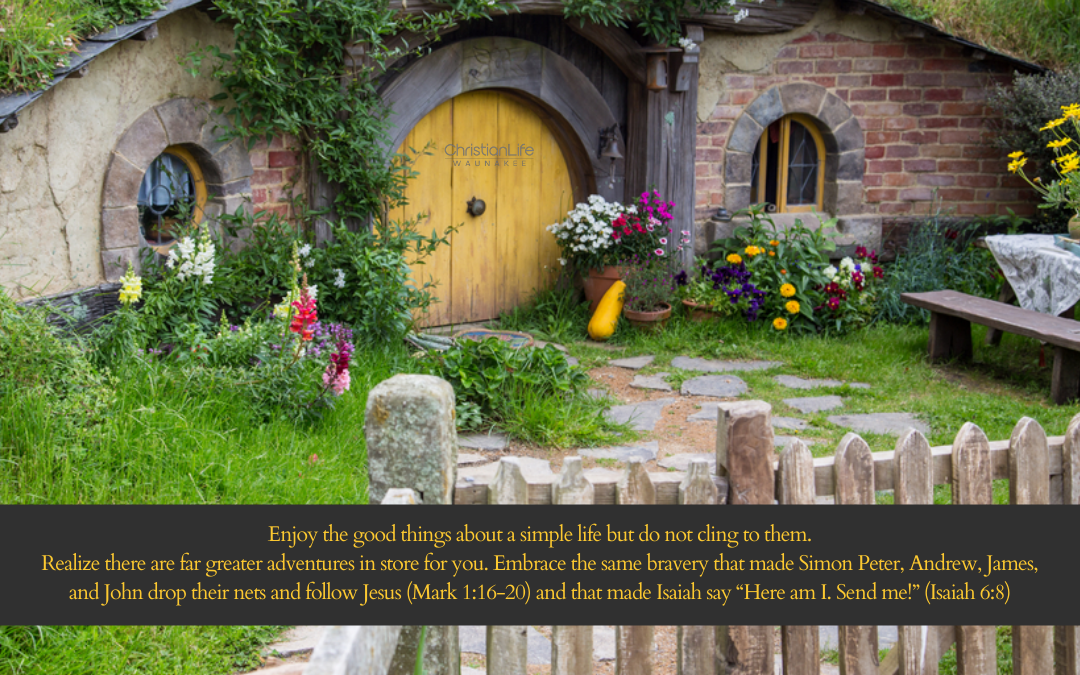Officially designated in the real world as Hobbit Day, September 22 is the fictional shared birthday of Frodo and Bilbo Baggins, hobbits of the Shire—whose birthday party kicks off the events of The Fellowship of the Ring by J.R.R. Tolkien and the movie of the same name directed by Peter Jackson.
In the Lord of the Rings fictional universe, Hobbits are a wholesome bunch known for their love of home and hearth. They’re small (2-4 feet tall), wear bright colors and no shoes, and eat six to seven meals a day when they can. They thrive on comfort, safety, and predictability, and in Tolkien’s words, “they love peace and quiet and good tilled earth” (The Fellowship of the Ring). As a rule, they do not love adventure or change, which is why it was considered so unusual that both Bilbo and Frodo became the key players in the events of The Hobbit and The Lord of the Rings respectively, both leaving their easy life in the Shire to go on epic and perilous quests that would shape the future of their world.
Bilbo at first values comfort and safety above all else, but eventually learns that there are more important things than that. In the beginning of The Hobbit, Bilbo Baggins is minding his own business when the wizard Gandalf bursts into his life, having chosen him to accompany a group of dwarves, led by Thorin, on a quest to liberate their former home from a fierce dragon. Bilbo is adamant that he will do no such thing:
“We are plain quiet folk and have no use for adventures. Nasty disturbing uncomfortable things! Make you late for dinner!” (Tolkien, The Hobbit).
He’s fussily attached to his dishes, pocket handkerchiefs, and other belongings, but is eventually convinced to join the quest. He grows quite fond of Thorin and the others and in the end is glad to have shared their perils, no matter how uncomfortable it has made him. At the end of the book, he returns home to the Shire having found his place in the wider world—and in possession of a mysterious magic ring that makes him invisible when he wears it.
In The Lord of the Rings, Bilbo leaves the Shire suddenly after his 111th birthday party, giving the ring to his nephew, Frodo. We learn from Gandalf that it wasn’t just an ordinary magic ring, but the One Ring belonging to the Dark Lord Sauron, who personifies evil and whose life force is tied to the Ring. With it, he would have the power to destroy everything good and cover the world in darkness. Because it is evil, the Ring corrupts all those who carry it, except that Frodo seems less affected by it than others. When he realizes what Bilbo has bequeathed to him, Frodo is at first upset and frightened at the prospect of the danger he is in:
“I am not made for perilous quests. I wish I had never seen the Ring! Why did it come to me? Why was I chosen?” (Tolkien, The Fellowship of the Ring)
Even so, Frodo accepts the responsibility to keep the Ring, remove it from the Shire, and get it to Rivendell, the city of the elves, where he assumes it will be passed off to more capable hands. During the journey, he feels the draw of the Ring’s evil and is wounded by the servants of Sauron attempting to wrest it from him. Once he’s healed, a council of the world’s various races (dwarves, elves, humans, wizards, hobbits) is called, and it is decided that the Ring must be destroyed in Mount Doom (the place where it was made and the only place it can be destroyed) in Mordor, the keep of the Dark Lord Sauron. Someone must volunteer for a mission that’s sure to end in certain death. Then, we get these words from Frodo:
“An overwhelming longing to rest and remain at peace by Bilbo’s side in Rivendell filled all his heart. At last with an effort he spoke, and wondered to hear his own words, as if some other will was using his small voice. ‘I will take the Ring,’ he said, ‘though I do not know the way.’” (Tolkien, The Fellowship of the Ring)
Despite his lack of qualifications, despite his weariness and desire for rest, despite his fear of what will happen to him, Frodo willingly chooses to put his own welfare aside for the sake of helping the rest of the world. In Christ, we have the power to do the same.
There’s nothing wrong with comfort. Nothing whatsoever. Tolkien doesn’t fault the hobbits for loving their life in the Shire. Their love of simple things keeps them going throughout their quests. But neither does he allow them to stay safe in their hobbit holes when the world needs them. Likewise, we should embrace the same bravery that made Simon Peter, Andrew, James, and John drop their nets and follow Jesus (Mark 1:16-20) and that made Isaiah say “Here am I. Send me!” (Isaiah 6:8). The bravery to love comfort yet be willing to leave it all behind if we must. To enjoy the good things about a simple life but not cling to them. To make warm dwellings here but realize there are far greater adventures in store for us.
As servants of Jesus Christ, let us, like Bilbo, learn to accept danger and discomfort if we’re called to. And let us, like Frodo, learn to be afraid, to know that surely there’s someone else who could do it instead, and yet say “I will do it.”
—————————————————

